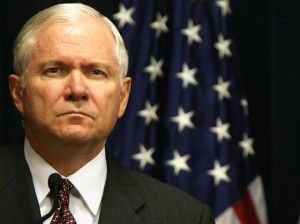Gates' Parting Shot At NATO Allies
America's military alliance with Europe — the cornerstone of U.S. security policy for six decades — faces a "dim, if not dismal" future, U.S. Defense Secretary Robert Gates said Friday in a blunt valedictory address.
In his final policy speech as Pentagon chief, Gates questioned the viability of NATO, saying its members' penny-pinching and lack of political will could hasten the end of U.S. support. The North Atlantic Treaty Organization was formed in 1949 as a U.S.-led bulwark against Soviet aggression, but in the post-Cold War era it has struggled to find a purpose.
"Future U.S. political leaders - those for whom the Cold War was not the formative experience that it was for me - may not consider the return on America's investment in NATO worth the cost," he told a European think tank on the final day of an 11-day overseas journey.
Gates has made no secret of his frustration with NATO bureaucracy and the huge restrictions many European governments placed on their military participation in the Afghanistan war. He ruffled NATO feathers early in his tenure with a direct challenge to contribute more front-line troops that yielded few contributions.
Even so, Gates' assessment Friday that NATO is falling down on its obligations and foisting too much of the hard work on the U.S. was unusually harsh and unvarnished. He said both of NATO's main military operations now — Afghanistan and Libya — point up weaknesses and failures within the alliance.
"The blunt reality is that there will be dwindling appetite and patience in the U.S. Congress — and in the American body politic writ large — to expend increasingly precious funds on behalf of nations that are apparently unwilling to devote the necessary resources or make the necessary changes to be serious and capable partners in their own defense," he said.
Without naming names, he blasted allies who are "willing and eager for American taxpayers to assume the growing security burden left by reductions in European defense budgets."


